Affiliate Marketing vs. Referral Marketing – What’s The Difference?

“I get by with a little help from my friends”. That could be the motto for both referral marketing and affiliate marketing. Both concepts leverage good relationships to generate traffic, sales, and better ROI.
There are many relationships that can be useful for a business: customers, friends, partners, and affiliates. In this article, we’ll review which are relevant for referral marketing vs affiliate marketing. We’ll explain how the two concepts work and what differentiates them, and we’ll throw in some tips and key data points too. So let’s get started.
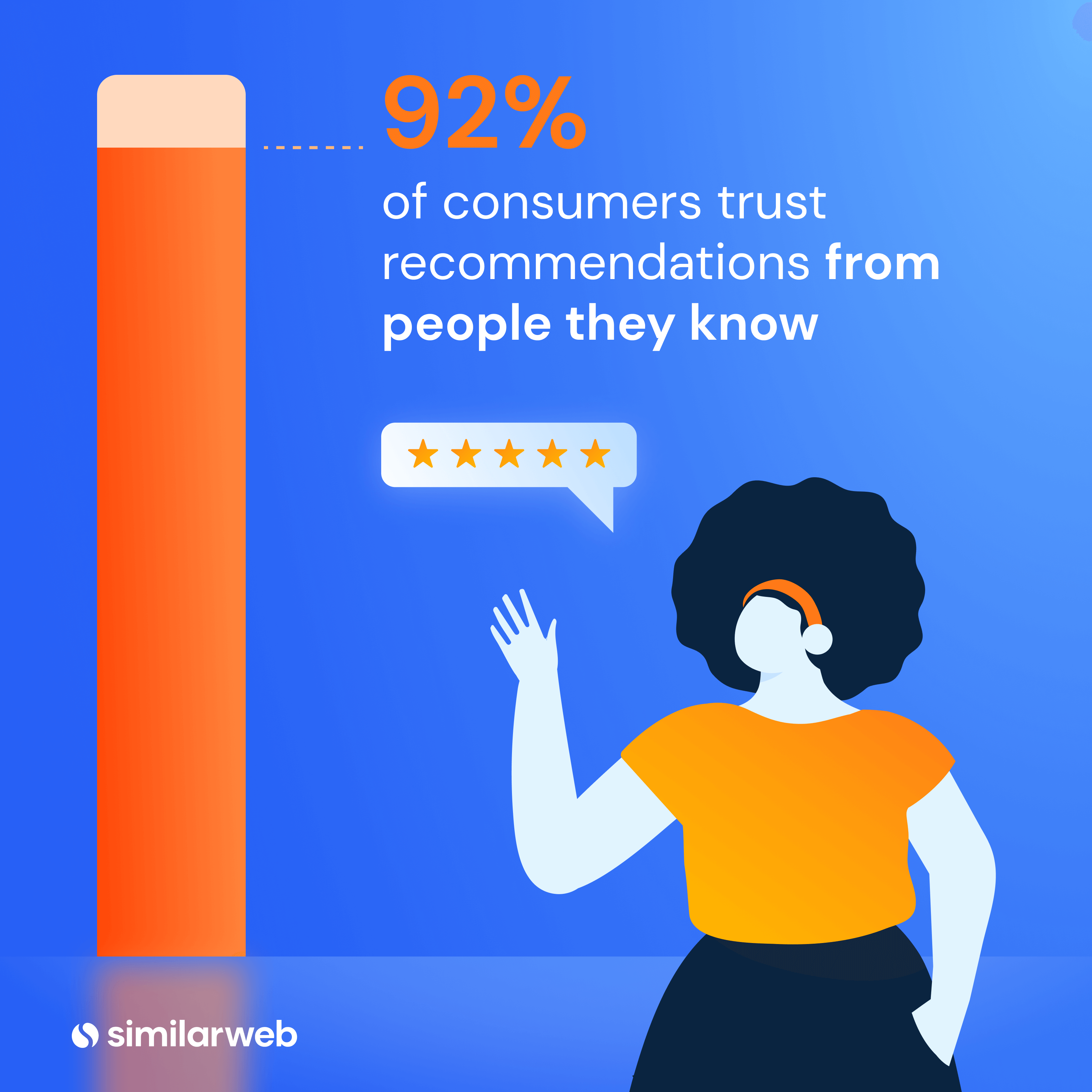
What’s the key difference between referral and affiliate marketing?
Affiliate Marketing recompenses successful third-party brand advocacy, while referral marketing rewards existing customers for bringing in their friends.
When you look at it this way, they are contrasting concepts. There are advantages and disadvantages to affiliate marketing and referral marketing but they aren’t the same. When you understand how companies benefit differently from each, you’ll be able to choose where and how they can be effective in your marketing strategy.
What is Referral Marketing?
Referral marketing is a marketing activity used by companies to incentivize existing customers to invite their connections to become new customers. In simpler words: The company offers a reward to existing customers when they bring in a friend who makes a purchase.
There’s enormous potential in every happy customer. 92% of consumers trust recommendations from people they know. This makes sense. Would you recommend a product you’re not satisfied with? Of course not. It would be embarrassing, and you’d lose people’s trust.
Marketers have always tried to find ways to tap into this potential, and digital marketing has the tools to help. For example, in the US, 81% of purchasing decisions are influenced by social media posts from someone familiar. The simple act of encouraging customers to share an image of what they bought can motivate a friend to do the same.
Referral marketing in the digital marketing arena
Before the internet, you’d simply bring a friend to the neighborhood store where you’ve been going with your mom since you were three. The owner would greet you by name and slip a few lolly-pops into your grocery bag for your kids. He’d give you a wink and shake your friend’s hand after packing her groceries.
It’s not that simple in the digital sphere (but in some ways simpler). First, you must let people know they can get a reward for bringing in a friend. 91% of people in the US say they would share special offers and deals with family members and friends.
Next, you need a system to trace the new purchaser back to the referrer. This is easily accomplished by providing a linked code. The code is individual to the existing customer, and when the newcomer uses it to purchase, the system recognizes who delivered it and grants the reward.
The reward can be a discount, a cashback, or a coupon for the next purchase. This way, you earn new customers and encourage existing customers to purchase again.
Social media has given this type of marketing a fresh boost. It’s super easy to add social share buttons with a referral code. And when someone shares on social media, they reach a much bigger audience than in any other communication form that is usually one-on-one.
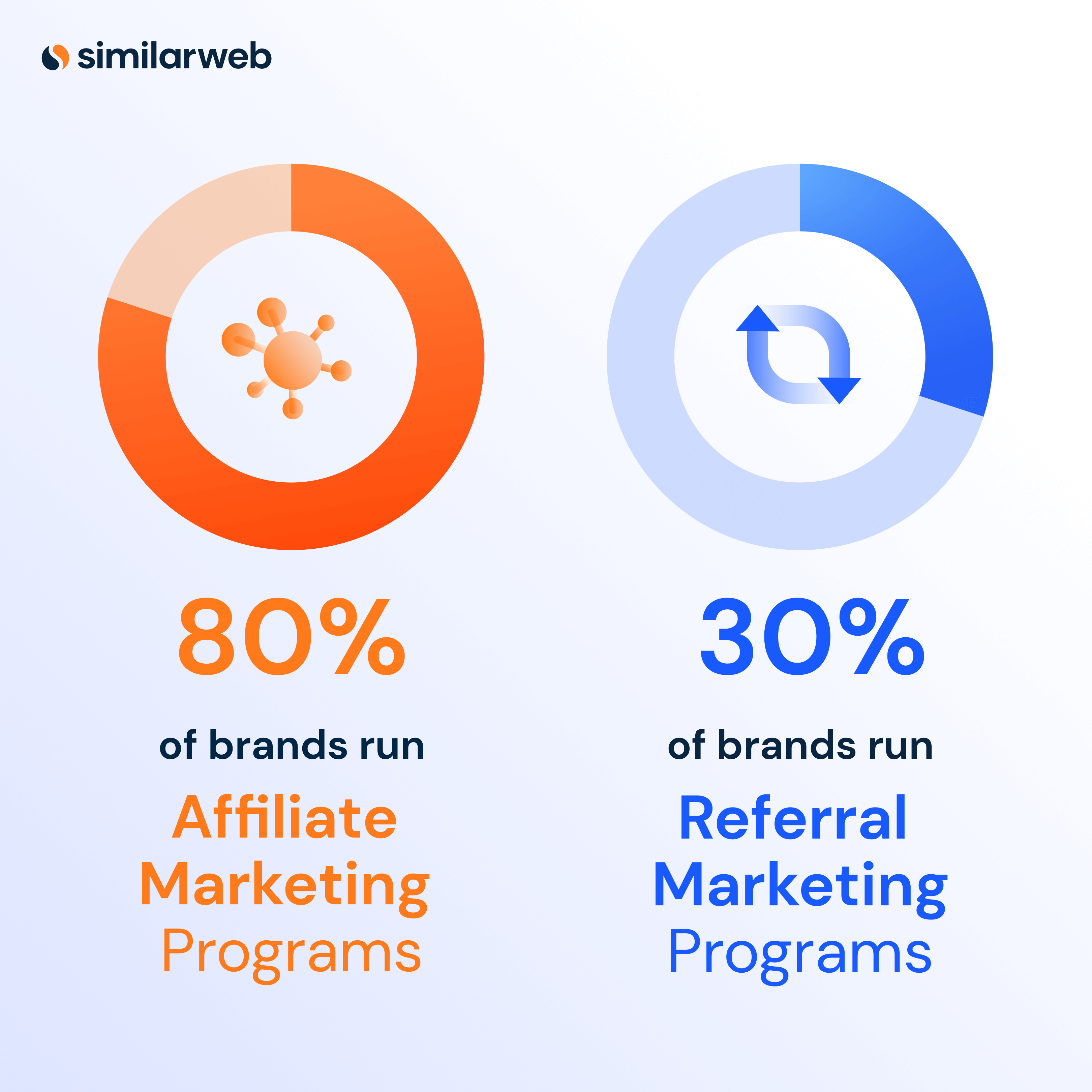
Interestingly, stats show that 80% of brands run affiliate programs, but only 30% of companies have a formalized referral program.
What is Affiliate Marketing?
Affiliate Marketing is a concept that builds on a digital advertising partnership in which one party owns a product, and the other provides the means to promote it. When the promotion yields results, the product owner compensates the publisher.
The payment can be a percentage of a purchase or a flat fee. Some affiliate programs pay a one-time lump sum for a referral, and others prefer recurring monthly payouts. It usually depends on the product type and the brand’s size.
In a way, affiliate marketing is a form of referral marketing because the affiliate or publisher refers potential customers to the merchant. However, other than typical referral marketing, we are looking at a business relationship.
Digital marketing has turned affiliate marketing into a billion-dollar industry because it is simple to implement. The vendor provides a link that includes a tracking pixel. This technology enables the tracking of user behavior and conversions.
Who’s involved in digital affiliate marketing?
Originally affiliate marketing was a partnership between businesses. Today, affiliates can be large, medium, or small businesses, but also individuals.
The very first affiliate program that was open to individuals rather than just businesses was Amazon, back in the days when Jeff Bezos only wanted to sell more books online. Making it accessible to the general public completely changed the character of affiliate marketing and made it into what we know today.
Today, with 900,000 affiliates, Amazon runs one of the biggest affiliate programs in the world.
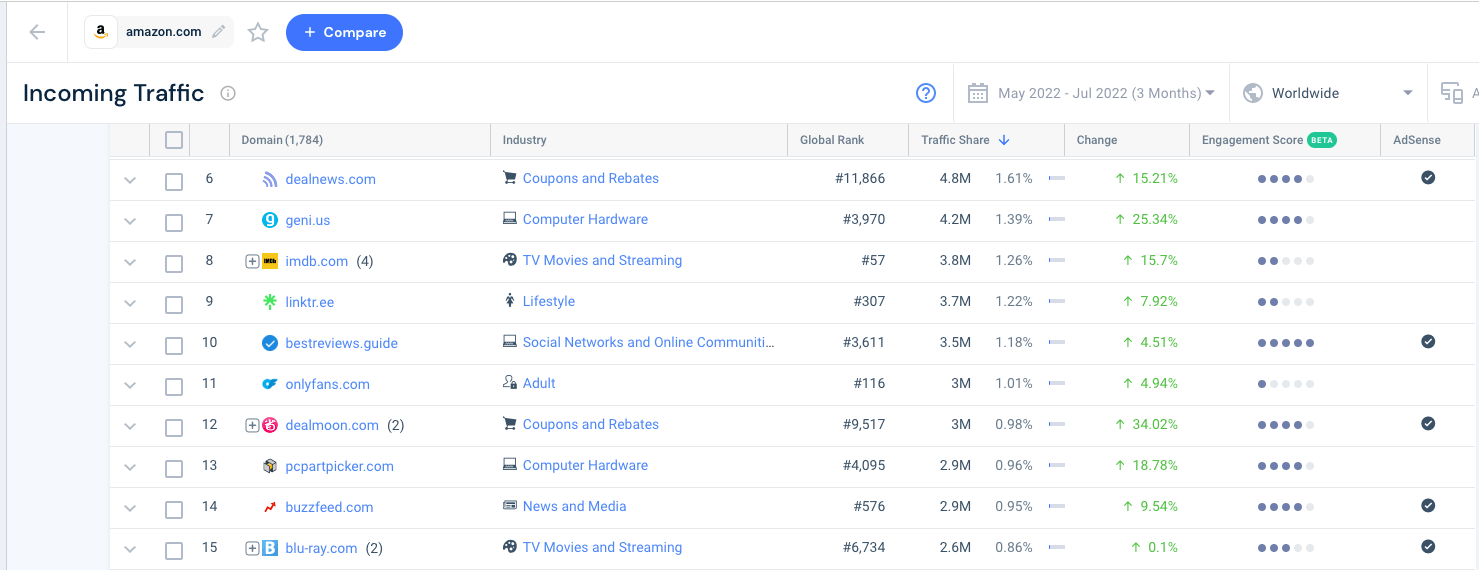
The affiliate industry is full of digital solutions to efficiently run and scale programs.
- Affiliate networks provide platforms where advertisers and publishers can match up and create mutually beneficial relationships.
- Tracking software provides solutions for affiliate managers to stay on top of everything that’s happening and how affiliates perform.
- One website can run its own affiliate program and at the same time be an affiliate for another site.
As much as 81% of vendors and 84% of publishers in the US are using affiliate marketing. It looks like almost every commercial website – and a lot of non-commercial sites – are involved one way or another in affiliate marketing.
There are several reasons:
- 83% of marketers use affiliate marketing to increase their brand awareness.
- 79% of marketers use affiliate marketing to engage their existing customers.
Differences between Affiliate and Referral Marketing
There are three areas where the differences are evident: The relationship, the type of reward, and the medium of sharing. However, as a business, you need to also look at the purpose, the scale, and the operational implementations.
We’ve listed referral vs affiliate marketing in the following table:
| Referral Marketing | Affiliate Marketing |
|---|---|
| Referrers are customers. | Affiliates are business partners. |
| Rewards are related to the vendor (discount, voucher, etc.) | Affiliates receive an actual payment |
| Referral marketing targets individuals or groups of individuals | Affiliate marketing targets a general audience |
| Requires some relationship between referrer and referee | No relationship between the affiliate and new customer |
| Relies on personal recommendation. | Uses advertising and publishing techniques. |
| Builds trust and loyalty. | Drives traffic. |
| Increases chances of recurring purchases. | Generates leads. |
| Limited to your customer base’s reach | Almost unlimited scalability |
| Requires minimum set-up and monitoring | Can turn into a business unit to manage the program |
| One-time activity | Ongoing business relationship |
| No technical skills are required from the referrer | Requires some technical proficiency from the affiliate |
Similarities of Affiliate and Referral Marketing
-
- Both are cost-effective because resources and investment are lower than in most other forms of digital marketing.
- In both marketing concepts, the one promoting the product doesn’t own or sell it.
- Both referrers and affiliates get compensated based on performance or action taken.
- Both concepts aim to extend the reach and bring in more business.
- Neither referral nor affiliate marketing is campaign-based; both are ongoing marketing techniques.
- Each method requires some level of trust between the involved parties.
- Both methods use a similar link and tracking technology.
Affiliate vs. referral marketing – what’s right for you?
That may not be the right question to ask. When choosing your marketing strategies, there’s no need to set affiliate marketing vs. referral marketing against each other. A company can choose one, apply both, or neither. The question is what are your marketing goals and how are you going to achieve them?
After you understand the differences and similarities, you probably have a pretty good idea of what each one can (or can’t) do for your business.
To optimize your marketing mix, you should evaluate each one separately. Consider your marketing objectives and evaluate if referral marketing supports them. Ask the same question for affiliate marketing.
For referral marketing, the answers are relatively simple. If you have a reasonable number of returning customers, you can increase the number of purchases or the average purchase value further. Referral marketing isn’t likely to do the job if you need to increase traffic and leads.
Affiliate marketing, on the other hand, comes in many variations and can support your marketing goals in different ways. For example, an affiliate program that engages bloggers or influencers can do more than drive traffic. Quality content helps build authority and credibility, and stats show that nearly 65% of affiliate marketers generate traffic by blogging. Affiliates can also do email marketing, PPC, SEO, and more.
How to find the right affiliates
See what’s common in your industry. Some industries rely heavily on affiliates, and you won’t find much advertising by the brands themselves (i.e., gaming and fintech).
In ecommerce, affiliate marketing is responsible for 16% of global sales, and its popularity is growing. The industry uses coupon- and deal sites, reviews, and influencers to promote their products. In the UK, price comparisons are the most common affiliate marketing activity. The competitors’ affiliates feature on Similarweb allows you to identify who your competition partners with and how much website traffic the affiliates generate.
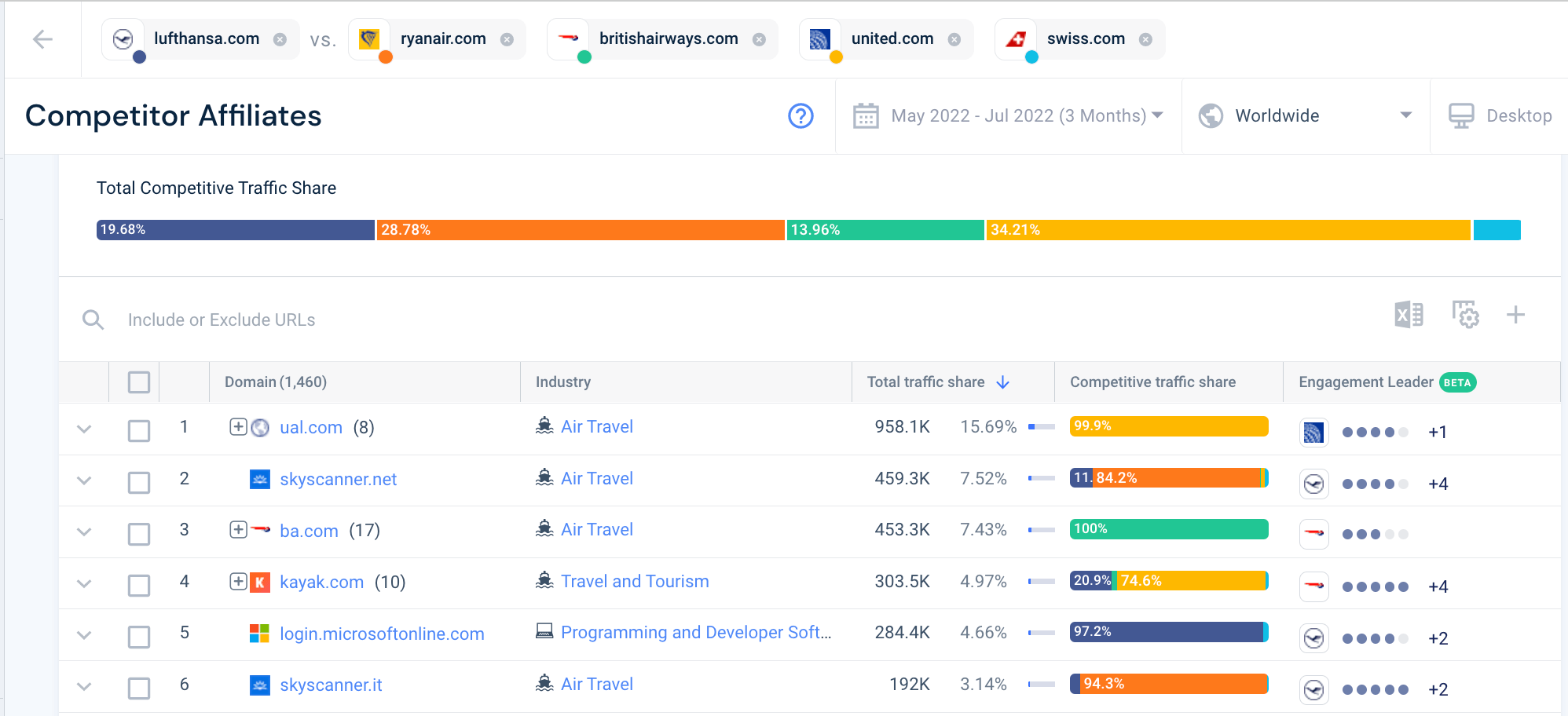
Check what your competitors do and which marketing concepts work for them. Use the Similarweb affiliate research tool to find your competitor’s affiliates. See who sends them traffic and how much. Discover what type of affiliate marketing is most effective for them and who the top affiliates are.
And why not reach out to these affiliates and offer them an affiliate partnership? Almost all publishers work with multiple brands and networks.
Enter a keyword that’s highly relevant to your business into the Similarweb keyword affiliate feature and get a list of sites that receive and drive traffic. With Similarweb you can also identify suitable affiliates based on the top keywords of any industry. The platform lets you evaluate the affiliate’s strength, showing traffic volume and engagement scores.
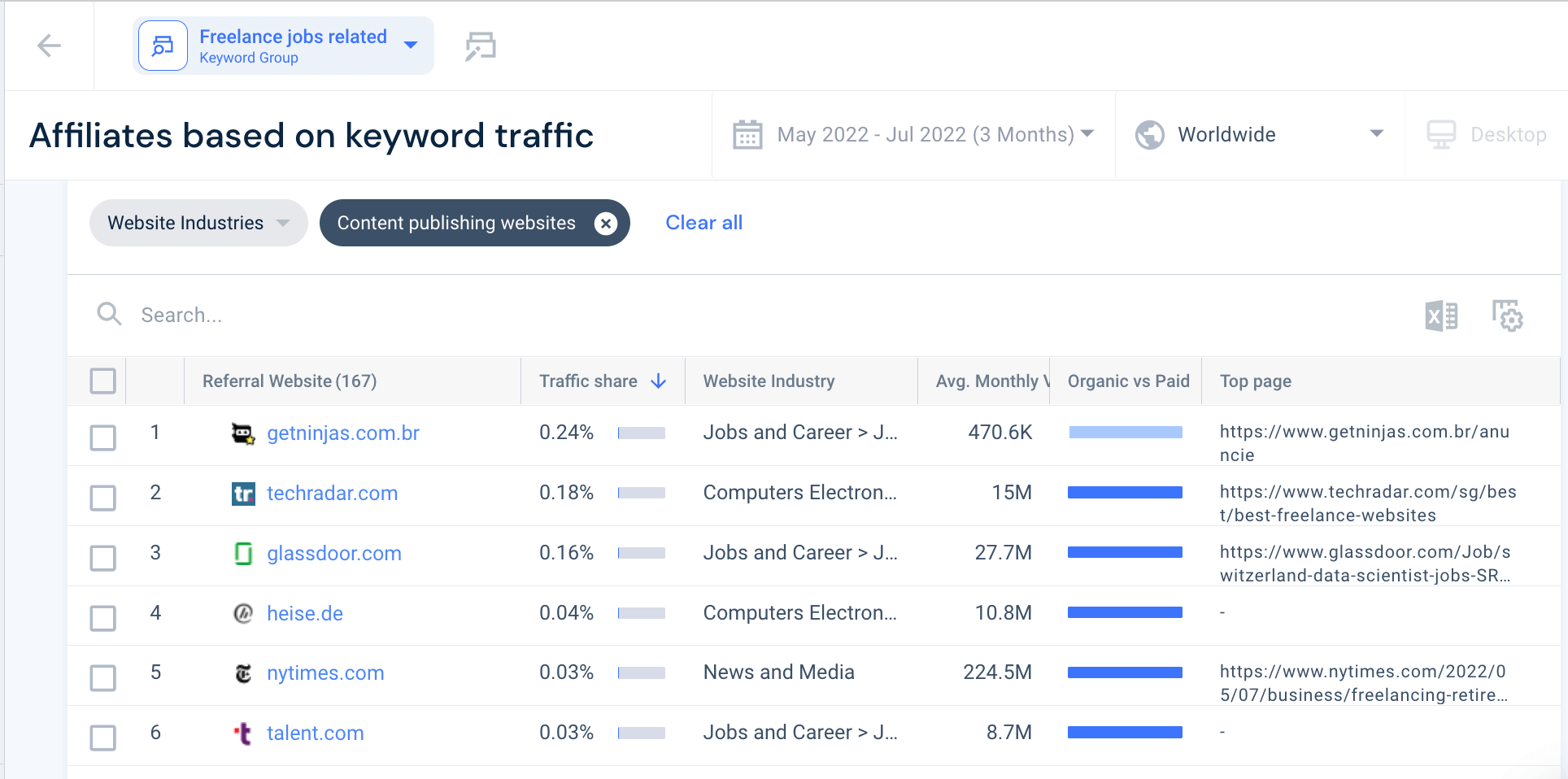
Conclusion
You don’t have to do it all by yourself. To save cost and effort you can let others promote your products or services.
The trick is to find the formula that will bring the best results for your business and for that it’s critical to get industry data. With accurate, reliable and fresh insights you can beat the competition and boost your marketing.
FAQs
What is the difference between referral marketing and affiliate marketing?
Both are marketing concepts in which you let others promote your product and reward them based on results. In referral marketing, customers refer friends in return for a discount or benefit; in affiliate marketing, you partner with other businesses that receive a fee.
What is the best referral program?
A good referral program increases your customer base, creates loyal customers, and generates more sales. Generally, referral programs work best when made easy for existing customers, for example, via social media.
Which is the best affiliate program?
The best affiliate programs are the ones that generate maximum leads. It depends on your industry, product type, and business size which is best suited for you. Research what works for your industry and similar businesses.
The #1 affiliate marketing research tool - get started
Give it a try or talk to our marketing team — don’t worry, it’s free!







